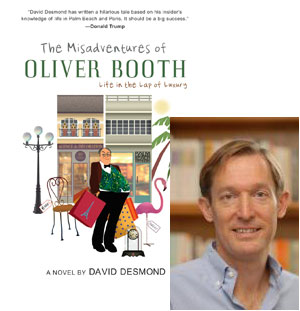David Desmond Loves to Watch Egos in Motion

The eponymous star of David Desmond‘s first novel, The Misadventures of Oliver Booth: Life in the Lap of Luxury, is not especially likable at first encounter. In fact, he’s a colossal jerk. Desmond says he drew upon several people he encountered in Palm Beach and Paris, blending their traits into one massively narcissistic figure and then turning him loose on high society. In this essay, he explains how his pre-literary background helped hone his observational skills. (New Yorkers will have a chance to meet Desmond on October 16, when he’ll be reading at the Park Avenue Borders.)
I was a clinical psychologist in a previous life, although not in the Shirley MacLaine sense. I’m frequently asked how I decided to make a transition into a life as a novelist. I’ve never really thought of it as a career change, though, more as an effort to attack the same problem from a slightly different angle.
I discovered the profession of clinical psychology in my early teenage years. I didn’t really understand what that occupation entailed, but I knew that it involved the study and treatment of dysfunctional human behavior. I was fascinated by other people and, perhaps at too young an age, I had begun reading the existentialists, who with their nihilism provided very little in the way of constructive advice about the human condition. In my doctoral training, I studied a wide range of theories of personality, but I connected best with ego psychology and the insights that it provided into character disorders such as pathological narcissism and their infantile roots. For many years, it was common for people that I would meet at cocktail parties to ask, “Are you analyzing me right now?” I would jokingly reply, “No, I’m finished,’ but in fact that question was usually quite reasonable because there’s nothing more interesting than meeting new people, that is, if one takes the time to get to know them.
Every person has a story to tell. Although the well-adjusted among us can tell their own stories with some degree of insight, those who are more dysfunctional keep psychologist/writers such as myself in business.
28 September 2008 | guest authors |
Peter Manseau: It’s Okay to Think This Book Is About Me

“Whenever I’ve attempted fiction, it’s never had anything to do with my life,” says Peter Manseau—but that doesn’t mean he won’t play with the old stereotype of the autobiographical first novel. Like Manseau, the unnamed young co-protagonist of Songs for the Butcher’s Daughter uses the Hebrew he learned in college to organize collections of Yiddish literature at a book depository, and “I don’t mind the association,” he tells me; if readers think he’s that character, he theorizes, it may lend additional plausibility to the story about meeting an aging Yiddish poet, Itsik Malpesh, and translating the memoirs of his childhood in Kishinev and emigration to New York. (It’s a testament to his skill as a writer, by the way, that you can read the entire story and never realize that the character’s name never comes up; he still feels so real in a psychological and emotional sense that it doesn’t matter.)
“Originally I thought the novel was going to be entirely Malpesh’s memoirs,” he explains as we chat at the counter of a Union Station coffee shop near his Washington, D.C. home. “But I felt that there was a point of access for the reader that was missing… It felt like historical fiction of the sort that I enjoy reading but did not want to write.” By adding the perspective of the young translator, Manseau hopes that readers have “a place to stand in relation to Malpesh,” especially when it comes to the revelations about his past in the novel’s later chapters—revelations which radically disrupt Malpesh’s self-presentation.
19 September 2008 | interviews |

 Our Endless and Proper Work is my new book with Belt Publishing about starting (and sticking to) a productive writing practice.
Our Endless and Proper Work is my new book with Belt Publishing about starting (and sticking to) a productive writing practice. 
